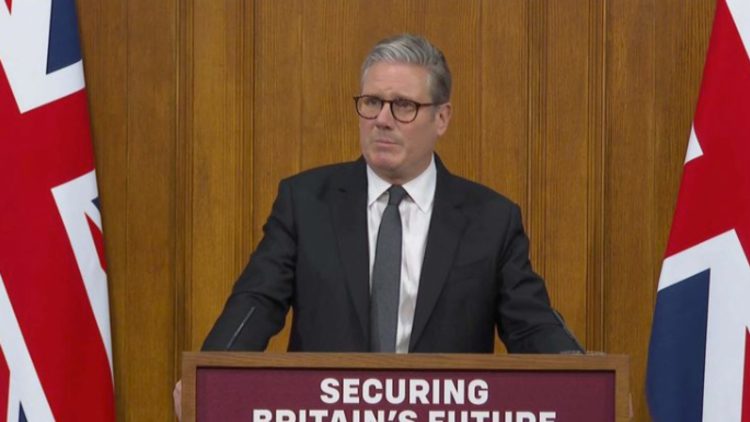In his foreword to the immigration white paper, Keir Starmer claims the damage done to the UK by net migration soaring under the Tories has been “incalculable”
He says: “In 2023, under the previous government, inward migration exploded to over a million people a year – four times the level compared with 2019. This was a political choice that was never put before the British people. In fact, quite the opposite – the previous government repeatedly promised inward migration would be brought under control. Instead, Britain became a one-nation experiment in open borders.
“The damage this has done to our country is incalculable. Public services and housing access have been placed under too much pressure. Our economy has been distorted by perverse incentives to import workers rather than invest in our own skills. In sectors like engineering, for example, apprenticeships have almost halved while visas doubled.
“But arguably even worse is the wound this failure has opened when it comes to trust in politics. It is a wound, as I said on my first day as prime minister, that can only be healed by actions not words. This white paper is just that.”
According to the annex, measures in the white paper should reduce immigration numbers by around 100,000 a year.
Care home staff
Martin Green, Care England’s chief executive, said in a statement: “This is a crushing blow to an already fragile sector. The government is kicking us while we’re already down.
“For years, the sector has been propping itself up with dwindling resources, rising costs, and mounting vacancies. International recruitment wasn’t a silver bullet, but it was a lifeline. Taking it away now, with no warning, no funding, and no alternative, is not just short-sighted – it’s cruel.
“We’re told to wait for the employment rights bill and a fair pay agreement, but those reforms are years away and come with no significant funding attached. In the meantime, we’ve lost 70,000 domestic workers over the last two years, vacancies still remain sky-high, and many providers are on the brink of collapse. Who do ministers think is going to care for people tomorrow, next week, or next month?”
Scotland’s equalities minister Kaukab Stewart said: “The UK Government’s plans on migration stand in stark contrast to our values and they do not reflect Scotland’s distinct population needs …
“Scotland needs talented and committed people from across the world to live, work and study here without excessive barriers. A one-size fits all approach to immigration fails to meet the needs of Scotland and much of the UK. In particular, any plans to end international recruitment of care workers will be devastating for the care sector in Scotland and across the UK.”
Green Party
The Green party has denounced the immigration white paper proposals as “panicked and misguided”.
In a statement, Carla Denyer, the party’s co-leader, said: “These ill-thought-through reforms are the triumph of a panicked and misguided rush to create headlines and try to win back Reform voters.
“From closed down youth centres to shuttered pubs, people in all parts of the UK are feeling the bonds that hold their communities together dissolving. And whether it’s rebuilding intergenerational relationships, or helping those who come here from abroad to integrate, strengthening those bonds requires support and crucially funding from central government. But far from rebuilding our communities, this government’s reforms are going to make things worse.
“In particular, at a time when the care sector is already stretched to breaking point, and public support for people coming from overseas to work in our care sector is consistently strong, it’s wild that this government is ignoring public opinion and making it even harder to recruit badly-needed care staff.”
CBI concern
The CBI, which represents business, particularly big firms, is never particularly antagonistic towards government.
However, in a statement from Rain Newton-Smith, its chief executive, it has raised several objections to the government’s immigration white paper plans.
Newton-Smith suggested the PM was wrong to say business has become reliant on cheap foreign labour. In his speech in No 10 this morning, Keir Starmer complained that the current immigration system “encourages some businesses to bring in lower-paid workers rather than invest in our young people”. But Newton-Smith rejected this analysis.
She said: “The reality for businesses is that it is more expensive and difficult to fill a vacancy with immigration than if they could hire locally or train workers. Work visas already require higher pay than most domestic workers get for the same job. When considered alongside the large fees and accompanying charges, foreign workers are simply not the ‘easy’ or ‘cheap’ alternative.”
She said she was concerned about the impact of the plans on universities.
“Universities are centres of growth, innovation and opportunities. Policy changes that risk making the UK a less attractive place to study or increase costs confronting universities will have knock-on impacts for the competitive strength of UK Higher Education as a growth export, and young people’s ability to access degree-level education at home. These trade-offs need to be considered if the government is serious about developing domestic talent and driving growth.”
And she said that stopping people getting skilled worker visas for jobs that are not degree level could be a mistake.
“Businesses will also carefully consider the detail of proposals to limit visas for skilled jobs below degree level. Labour shortages can’t be solved by training alone. With the UK’s workforce set to shrink in the future as our population ages, it’s more important than ever that we support the business investment needed to underpin tech adoption and training.”
Island of strangers?
1.
2.
3.
4.
5.
Related: Farage’s new ‘manifesto’ gets a brutal reality check





